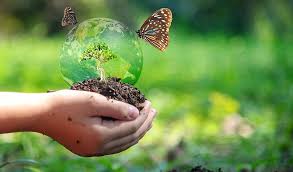The Importance of Conserving Our Natural Resources
Conserving our natural resources is crucial for the well-being of our planet and future generations. From water and air to forests and wildlife, these resources are essential for sustaining life on Earth. Here are some reasons why conservation is vital:
- Preserving Biodiversity: By conserving natural habitats, we protect a wide variety of plant and animal species from extinction, maintaining the balance of ecosystems.
- Sustainable Use: Conserving resources ensures that they will be available for future use, preventing depletion and promoting sustainability.
- Protecting Water Sources: Water conservation is critical as clean water becomes increasingly scarce. By using water efficiently and preventing pollution, we safeguard this vital resource.
- Combatting Climate Change: Conserving forests and reducing carbon emissions help mitigate climate change by preserving carbon sinks and reducing greenhouse gas emissions.
It is important for individuals, communities, and governments to take action in conserving our natural resources through sustainable practices, responsible consumption, and environmental protection efforts. Together, we can make a positive impact on the health of our planet and ensure a sustainable future for all.
7 Essential Tips for Effective Conservation
- Reduce, reuse, and recycle to minimize waste
- Conserve water by fixing leaks and using water-saving appliances
- Switch to energy-efficient lighting and appliances
- Use public transportation, carpool, or bike to reduce carbon emissions
- Plant trees and create green spaces to help offset carbon footprint
- Buy products with minimal packaging and choose reusable items over disposable ones
- Educate yourself and others about the importance of conservation
Reduce, reuse, and recycle to minimize waste
Reducing, reusing, and recycling are key practices in minimizing waste and promoting sustainability. By reducing our consumption, reusing items whenever possible, and recycling materials to give them a new life, we can significantly decrease the amount of waste that ends up in landfills. This simple yet effective approach not only conserves valuable resources but also helps to protect the environment by reducing pollution and energy consumption associated with producing new goods. Embracing the principles of reduce, reuse, and recycle is a meaningful way for individuals to contribute to a cleaner, greener planet for current and future generations.
Conserve water by fixing leaks and using water-saving appliances
Conserving water is essential for sustainable living. One effective way to conserve water is by promptly fixing leaks in faucets, pipes, and toilets to prevent unnecessary water wastage. Additionally, using water-saving appliances such as low-flow showerheads, faucets, and toilets can significantly reduce water consumption in households. By taking these simple yet impactful steps to conserve water, we can contribute to the preservation of this precious resource for future generations and promote environmental sustainability.
Switch to energy-efficient lighting and appliances
Switching to energy-efficient lighting and appliances is a simple yet impactful way to conserve energy and reduce our carbon footprint. By replacing traditional incandescent bulbs with LED lights and upgrading old appliances to energy-efficient models, we not only save on electricity bills but also contribute to a greener environment. Energy-efficient lighting and appliances consume less energy, resulting in lower greenhouse gas emissions and less strain on natural resources. Making this switch is a practical step towards sustainability that benefits both the planet and our wallets in the long run.
Use public transportation, carpool, or bike to reduce carbon emissions
Using public transportation, carpooling, or biking are effective ways to reduce carbon emissions and help conserve our natural resources. By choosing these eco-friendly transportation options, individuals can significantly decrease their carbon footprint and contribute to mitigating climate change. Not only does this help in reducing air pollution and traffic congestion, but it also promotes sustainable living practices that benefit both the environment and our communities. Making simple changes in how we travel can have a positive impact on conserving our planet for future generations.
Plant trees and create green spaces to help offset carbon footprint
Planting trees and creating green spaces are effective ways to help offset our carbon footprint. Trees act as natural carbon sinks, absorbing carbon dioxide from the atmosphere during photosynthesis and storing it in their biomass. By increasing tree cover and green spaces, we can reduce the amount of carbon dioxide in the air, thereby mitigating the impacts of climate change. Additionally, trees provide numerous other benefits such as improving air quality, providing habitat for wildlife, and enhancing the beauty of our surroundings. By actively planting trees and promoting green spaces in our communities, we can contribute to a healthier environment for present and future generations.
Buy products with minimal packaging and choose reusable items over disposable ones
Choosing products with minimal packaging and opting for reusable items over disposable ones are simple yet impactful ways to contribute to conservation efforts. By reducing the amount of packaging waste generated and embracing reusable alternatives, we can significantly decrease our environmental footprint. Making conscious choices while shopping not only minimizes resource consumption but also helps in reducing pollution and promoting a more sustainable lifestyle. Let’s embrace these practices to protect our planet for future generations.
Educate yourself and others about the importance of conservation
Educating yourself and others about the importance of conservation is a crucial step towards fostering a culture of environmental stewardship. By understanding the value of conserving our natural resources and ecosystems, we can inspire positive actions and behavior changes that contribute to a more sustainable future. Sharing knowledge about conservation not only raises awareness but also empowers individuals to make informed decisions that prioritize the well-being of our planet and all its inhabitants. Embracing education as a tool for change can drive collective efforts towards preserving the environment for generations to come.

